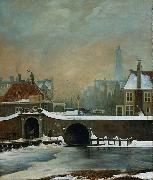
Oil On
Canvas, Real Flavor of Old Masters
|
Wouter Johannes van Troostwijk
|
|||
|
|
|||
| 1782-1810 Dutch Wouter Johannes van Troostwijk Gallery Dutch painter, draughtsman and etcher. In 1803 he was admitted to the Amsterdam Tekenacademie where he was a pupil of the director, Jurriaan Andriessen. Despite a highly successful student career that culminated in a gold medal from the Felix Meritis Society in 1807, he was unable to establish himself as a professional artist during the remainder of his very short working life in Amsterdam. Andriessen's studies from nature seem to have been an important influence; van Troostwijk was one of the earliest artists to paint en plein air. Although he looked back to 17th-century Dutch landscape art and to the work of his contemporaries, in such paintings as Landscape in Gelderland (c. 1808; Amsterdam, Rijksmus.; see NETHERLANDS, THE, fig. 21) he achieved a totally new lyricism in the rendering of atmospheric effects. The Raampoortje (1809; Amsterdam, Rijksmus.) displays a fresh colouristic touch rare in Dutch painting of this period. His Self-portrait (c. 1810; Amsterdam, Rijksmus.) is equally original in composition and colour. He also produced animal paintings in the manner of Paulus Potter, drawings and a few etchings towards the end of his life. Van Troostwijk died before his considerable talents could be recognized, and, although he has come to be seen as an important precursor of much late 19th-century Dutch painting, he had little influence on his immediate successors. | |||
|
|
|||
|
|
The Raamgate at Amsterdam new24/Wouter Johannes van Troostwijk-758787.jpg Painting ID:: 81565 Visit European Gallery |
oil on canvas 57 cm x 48 cm cjr | |
Height Width |
INS/CM |
||
|
X |
|
||
|
|
|||







